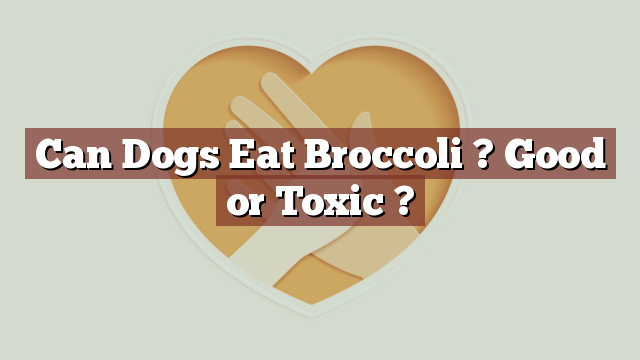Can Dogs Eat Broccoli? Good or Toxic?
As pet owners, it is important for us to be knowledgeable about what foods are safe for our furry friends to consume. One such food that often comes to mind is broccoli. Known for its many health benefits for humans, broccoli is a nutrient-rich vegetable that is packed with essential vitamins and minerals. But can dogs eat broccoli? Is it good for them or could it potentially be toxic? Let’s delve into the nutritional value of broccoli, the risks and safety considerations, the potential benefits or dangers, and what to do if your dog happens to eat broccoli.
Nutritional Value of Broccoli: Essential Vitamins and Minerals
Broccoli is a powerhouse of nutrients that provide numerous health benefits. It is rich in essential vitamins such as vitamin C, vitamin K, and vitamin A, which are important for maintaining a healthy immune system, promoting good vision, and supporting bone health. Additionally, broccoli contains important minerals like calcium, potassium, and iron, which are necessary for proper bodily functions.
Can Dogs Eat Broccoli? Risks and Safety Considerations
Can dogs eat broccoli? The answer is yes, dogs can eat broccoli! Broccoli is generally safe for dogs to consume in moderate amounts. However, there are a few things to consider before feeding broccoli to your furry friend. Firstly, it is important to remember that dogs have different dietary needs and digestive systems than humans. While broccoli is safe for dogs, it should always be given in small quantities as a treat or an occasional addition to their regular diet. Secondly, it is crucial to properly prepare the broccoli before feeding it to your dog. It should be thoroughly cooked to improve its digestibility and to prevent any potential digestive issues.
Potential Risks or Benefits of Feeding Broccoli to Dogs
Feeding broccoli to dogs can have both potential risks and benefits. On the positive side, the vitamins and minerals present in broccoli can contribute to your dog’s overall health and well-being. Broccoli is low in calories and high in fiber, making it a great option for dogs that need to lose weight or maintain a healthy weight. However, it is important to note that some dogs may experience gastrointestinal upset or gas when consuming broccoli, especially if it is given in large quantities or if they have a sensitive stomach. Additionally, broccoli contains a compound called isothiocyanate, which in large amounts can be harmful to dogs. This compound can cause digestive disturbances and may even lead to anemia. Therefore, it is crucial to feed broccoli to your dog in moderation and monitor their reaction to it.
What to Do if Your Dog Eats Broccoli: Monitoring and Symptoms
If your dog happens to eat broccoli, there is usually no need to panic. However, it is important to keep a close eye on your dog for any signs of discomfort or adverse reactions. Some common symptoms of digestive upset may include vomiting, diarrhea, or excessive gas. If you notice any of these symptoms or if they persist, it is recommended to consult your veterinarian for further guidance. They will be able to assess your dog’s specific situation and provide appropriate advice or treatment if necessary.
Conclusion: Moderation is Key, Consult Your Vet for Specific Guidance
In conclusion, dogs can eat broccoli as it offers several nutritional benefits. However, it is important to feed it to them in moderation and ensure that it is properly prepared. While broccoli is generally safe for dogs, it is always wise to consult your veterinarian for specific guidance regarding your dog’s individual dietary needs and any potential health concerns. Your vet will be able to provide you with the best advice and recommendations to ensure the well-being and safety of your furry companion. Remember, moderation is key when it comes to feeding any new food to your dog.
Thank you for investing your time in exploring [page_title] on Can-Eat.org. Our goal is to provide readers like you with thorough and reliable information about various dietary topics. Each article, including [page_title], stems from diligent research and a passion for understanding the nuances of our food choices. We believe that knowledge is a vital step towards making informed and healthy decisions. However, while "[page_title]" sheds light on its specific topic, it's crucial to remember that everyone's body reacts differently to foods and dietary changes. What might be beneficial for one person could have different effects on another. Before you consider integrating suggestions or insights from "[page_title]" into your diet, it's always wise to consult with a nutritionist or healthcare professional. Their specialized knowledge ensures that you're making choices best suited to your individual health needs. As you navigate [page_title], be mindful of potential allergies, intolerances, or unique dietary requirements you may have. No singular article can capture the vast diversity of human health, and individualized guidance is invaluable. The content provided in [page_title] serves as a general guide. It is not, by any means, a substitute for personalized medical or nutritional advice. Your health should always be the top priority, and professional guidance is the best path forward. In your journey towards a balanced and nutritious lifestyle, we hope that [page_title] serves as a helpful stepping stone. Remember, informed decisions lead to healthier outcomes. Thank you for trusting Can-Eat.org. Continue exploring, learning, and prioritizing your health. Cheers to a well-informed and healthier future!

